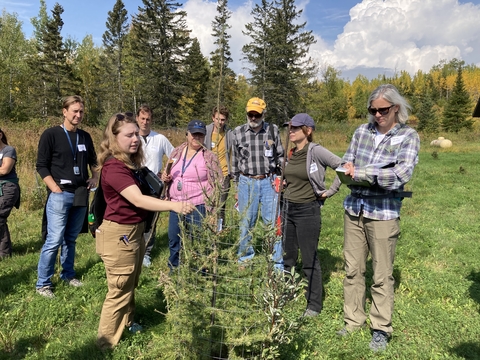Minnesota Woodland Steward is a comprehensive education program that teaches family forest owners and forest caretakers the ins and outs of forest health, timber harvesting, management for recreation and wildlife, estate planning, tax incentive programs and more.
Each program unit is an online, self-paced module with readings, exercises and a group discussion board. Scheduled Zoom meetings give learners a chance to ask questions of instructors and contribute to group learning by sharing their own experiences. Participants also attend three in-person field sessions throughout the course.
If you own property with woodlands, steward woodlands, or are looking to buy wooded property and just want to see what you’re in for, the Minnesota Woodland Steward program can help you become a successful woodland steward.
At the end of this course, you’ll be able to:
- Consider the different reasons and ways to manage woods and wildlife.
- Identify common native trees and invasive plants.
- Select appropriate trees for a woodland and know how to plant them.
- Map a woodland property and conduct a tree inventory.
- Meet and talk with local natural resources professionals.
- Discuss the financial considerations of land ownership (including timber marketing, tax incentives and estate planning) with family and financial advisors.
- Develop specific actions that will provide a path to leaving the land in a better condition for future generations.
- Serve as a mentor to other private woodland owners and stewards.
What you can expect from us:
- An expert-led, research-based educational program.
- Instructor feedback to your questions and concerns within 48 hours.
- New options, new ideas, and specific actions that will provide a path to leaving the land in a better condition for future generations.
What we expect from you:
- Completion of the online course modules.
- Participation in course discussion boards and Zoom meetings.
- Attend the in-person field tours if you can.
New content will become available each week, but students will be able to complete this course at their own pace. Participants will receive feedback from instructors on assignments and discussion posts and can expect to have clear goals, objectives, and action steps for their own woodland by the end of the course.
We are committed to providing quality education in a way that works for you. This course offers flexibility by offering content both online and in person. What does this look like?
- 1 to 2 hours of self-paced reading and assignments each week. Fourteen self-paced online modules are offered through the course website. Modules contain pre-recorded videos, exercises, and group discussions on woodland stewardship topics.
- Online meetings on Zoom. Three online meet-ups over Zoom will give you direct access to Extension and local forestry experts as they present on different topics related to the health of your woodland. Ask them your questions, and share your knowledge and experience with your peers.
- In-person field tours. Three in-person field tours will give you a chance to see several woodland stewardship projects. Instructors will guide your visit and answer your questions, and you will have an opportunity to meet with and learn from natural resource professionals and fellow woodland stewards.
See our sample syllabus for a typical course outline and schedule.
To successfully participate in this course, you will need a computer, tablet or smartphone with:
- Internet connection with a minimum bandwidth of 1.0 Mbps/600kbps (up/down).
- Headset with microphone, or headphones to use with your device’s built-in mic.
- Webcam for synchronous meetings.
- Canvas learning management access (system requirements).
- Zoom online meeting platform access (system requirements).
University of Minnesota Extension acknowledges we have an obligation to Tribal nations and their citizens to reduce barriers to participation in our programs and access to our services. We are committed to strengthening our relationships with Tribal nations and their citizens and continue to take meaningful actions toward meeting our responsibility. Therefore, we are waiving the fees associated with the Minnesota Woodland Steward program for Tribal members.
- 2016 - Southeast
- 2017 - Metro
- 2017 - Laurentian
- 2017 - North Shore
- 2018 - Central Lakes
- 2018 - Kettle River
- 2019 - Avon Hills
- 2019 - Farms and Woodlands
- 2020 - North Shore Lost Forest
- 2021 - Climate and Carbon
- 2022 - Itasca
- 2023 - Itasca
- 2023 - Northeast Arrowhead
Contact
Extension Educator Anna Stockstad, stock523@umn.edu or 218-726-6466, can answer your questions about this course.
Upcoming events
Online course


